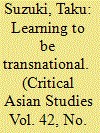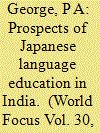| Srl | Item |
| 1 |
ID:
117501


|
|
|
|
|
| Publication |
2012.
|
| Summary/Abstract |
Language education for home-background speakers or heritage learners has recently attracted significant attention in many countries. This case study reports on some of the findings on these speakers' backgrounds, profiles and language identities, utilising the data collected from a survey and focus group interview with 10 tertiary-level Japanese home-background speakers. We found that although all are classified as 'home-background speakers', they are a very heterogeneous group of students in terms of their backgrounds and language identities. This paper also discusses the implications of the findings for Japanese language education designed for this group of students, and points to the necessity of understanding the diverse needs of these students when educators are developing courses of study for them.
|
|
|
|
|
|
|
|
|
|
|
|
|
|
|
|
| 2 |
ID:
094001


|
|
|
|
|
| Publication |
2010.
|
| Summary/Abstract |
Scholars and practitioners of heritage language education commonly hold two assumptions about heritage language: first, that heritage language is an official national language of a nation-state from which group originally migrated; and second, that heritage language is a vulnerable language on the verge of getting swept away by the national language of the nation-state of a migrant's current residence. This article questions these two assumptions by examining Japanese language education and speech practices among Okinawan-Bolivians in a rural agricultural community called Colonia Okinawa. Okinawan-Bolivians' heritage language education and speech practices suggest that immigrants who were marginalized in the nation-states of their migratory/ancestral origin, like Okinawans, consciously transform their linguistic heritage from a sub-national one to a national one in order to gain socioeconomic advantages in their migratory destination. Furthermore, when immigrant community leaders deem the international standing of the country of their migratory origin higher than their host country's status, such as Okinawan- Bolivian leaders in Colonia Okinawa, they regard heritage language education as a crucial means to maintain their community members' political, economic, and symbolic powers over other local residents. By ethnographically portraying the ways in which Japanese is taught and spoken in Colonia Okinawa, this article highlights the shifting scales and locations of the immigrant community's "ancestral homeland" and draws attention to the multiple meanings of the language the community designates as its "heritage."
|
|
|
|
|
|
|
|
|
|
|
|
|
|
|
|
| 3 |
ID:
086396


|
|
|
|
|
| Publication |
2009.
|
| Summary/Abstract |
India's understanding of Japan and the Japanese people, and Japan's understanding of India and Indian people are very superficial, and people in both country possess unrealistic, preconceived notions and outdated information on each other. Both India and Japan should shed their unrealistic, archaic and preconceived notions coming out of mutual ignorance.
|
|
|
|
|
|
|
|
|
|
|
|
|
|
|
|